In-depth insights into running shoe outsoles (road & trail)
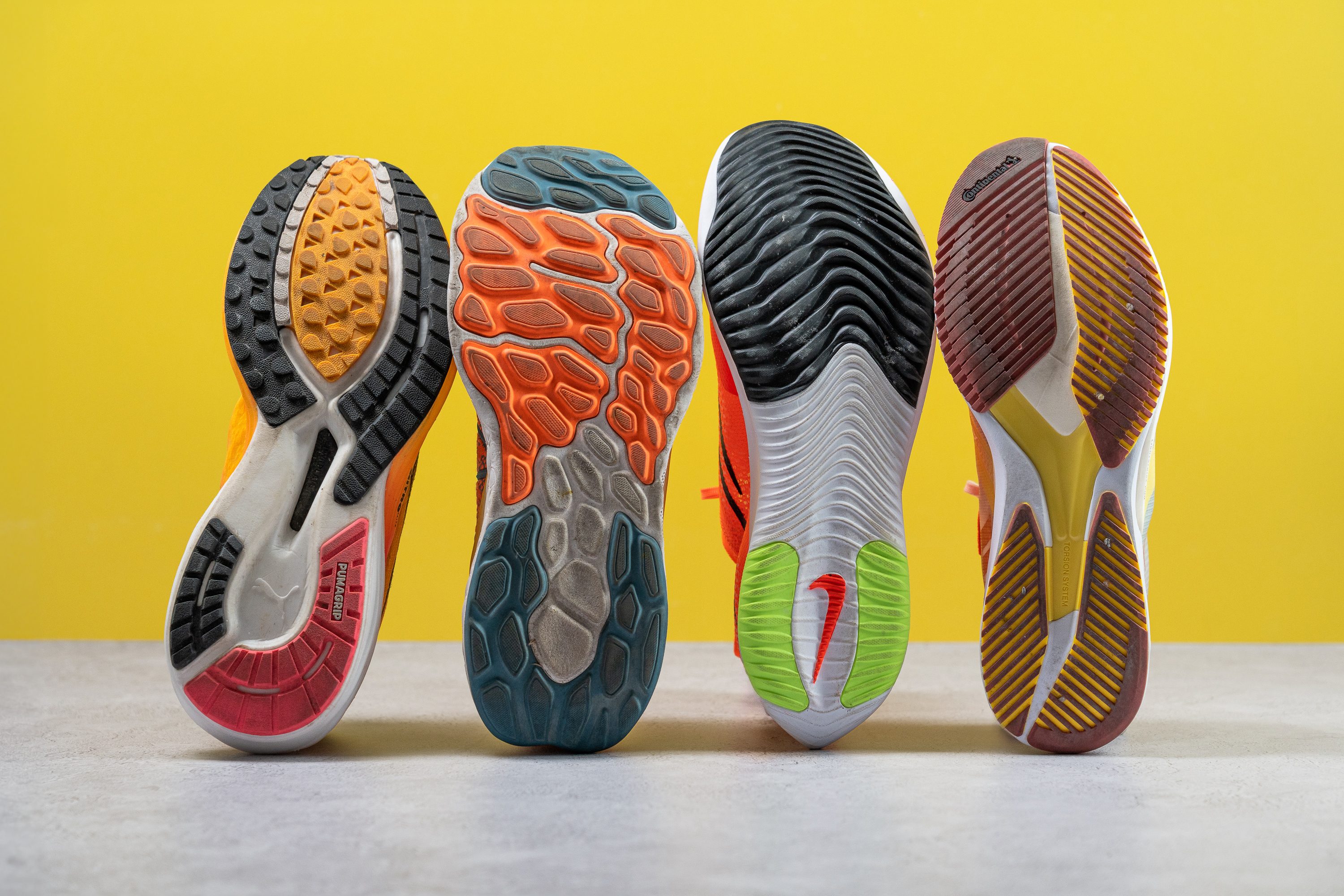
The outsole, a vital part of any running shoe, forms your crucial link with the ground during your run. Not only does it help prevent slips and falls, but it also ensures a firm grip, offering the traction necessary for a safe and effective run.
However, the importance of the outsole is often overshadowed by the advancements in midsole foams and cushioning technology. And it should not be overlooked, as the outsole plays a critical role in the success of a running shoe. In fact, no matter how much cushioning or responsiveness the midsole provides, the grip of a running shoe can potentially ruin an otherwise perfect product.
I vividly remember my father constantly repeating that I should never, ever skimp on car tires, a quality mattress, and shoes—basically, anything that keeps me separated from the floor. Let me tell you, he was damn right!
Do you always need a ultra-grippy outsole for road running?
If you're a road runner, you probably won't spot any difference between A++ and A-grade outsoles. Don't let this be the only deciding factor when picking out your shoes. In fact, most shoes offer ample grip on dry surfaces, but the situation shifts when you're running in damp conditions.
For example, let's consider the Vaporfly series. It's widely recognized as one of the best-selling racing shoe in the past two years and it has also achieved numerous podium finishes in the World Marathon Majors. However, its grip score (0.40) falls short compared to shoes like the ASICS Metaspeed Ray (0.70) or the Adidas Adizero Adios Pro 4 (0.55).
In dry or slightly wet conditions, this may not matter much, but it becomes a real concern when running in heavy rain, like during the Boston 2023 marathon. In that race, Adidas swept the men's podium probably, in part, due to their superior outsole performance.
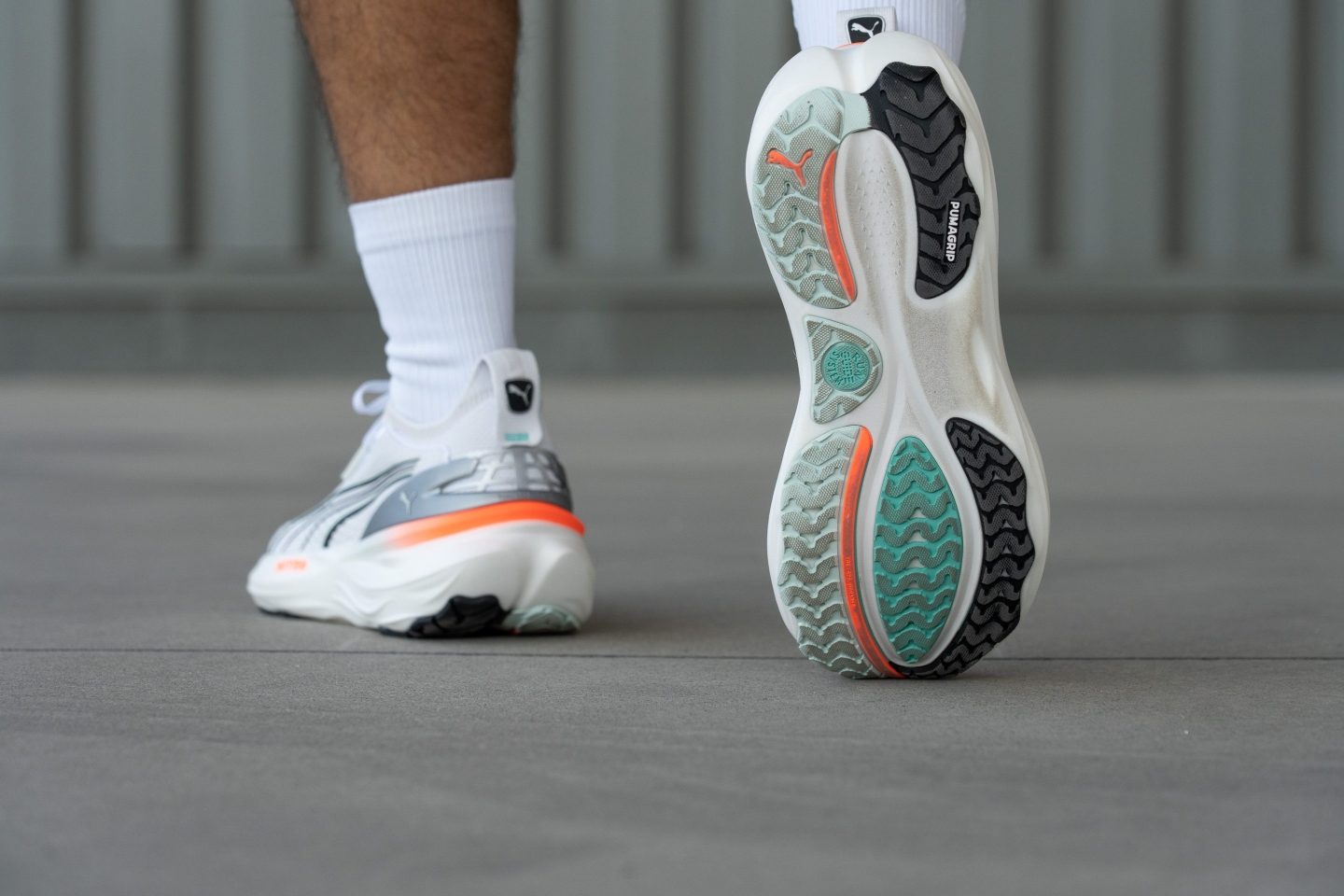
So, what do we recommend? It all depends on your circumstances.
If you live in a place where it seldom rains or snows, you can get away with almost any outsole. On the contrary, if you tend to run on wet, ice or even mud, you definitely want a grippy shoe, like the ASICS Superblast 2 with its world-class ASICSGRIP rubber.
Lab-tested traction results by brand
We made the decision to purchase an expensive SATRA TM144 machine to test the grip of every running shoe that makes its way into our lab, and that's how we collected hundreds of results that allows us to present you unique information about grip.
And one of the most common questions that we receive is: which is the best and worst brand in terms of traction? Well, let's find out. We have plotted all results from our lab, excluded minor brands with less than 5 different shoes test, and this is what we got.
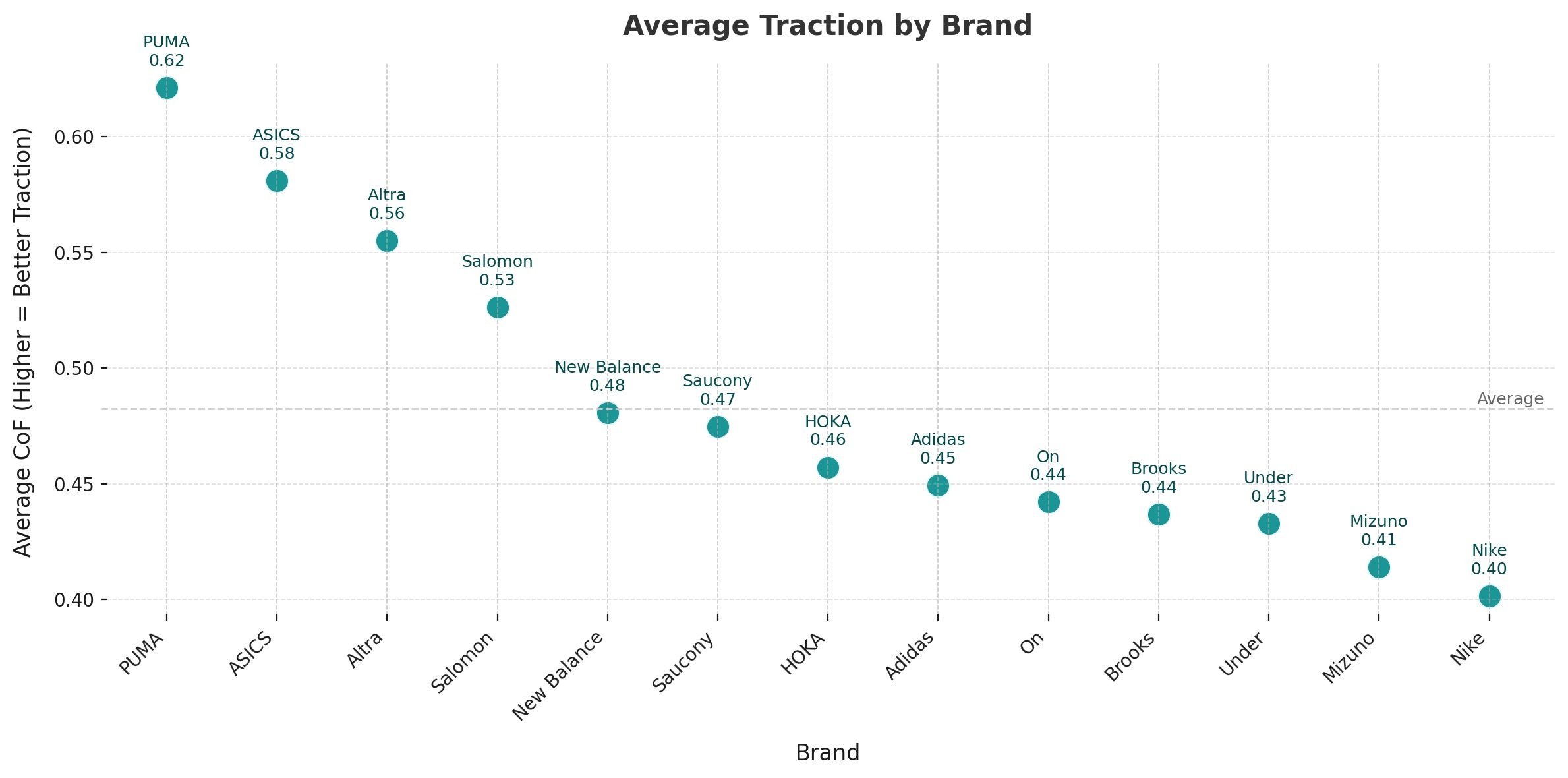
As shown here, PUMA, ASICS, and Altra deliver the best grip, while Nike, Mizuno, and Under Armour trail behind. It’s also surprising to see Adidas far from the top, mainly due to poor traction in their budget models like the Runfalcon 5. It's clear to us that grip depends more on rubber quality than on brand prestige.
Grip & durability: can you have both?
Achieving both grip and durability in a running shoe is challenging because there is a trade-off between the two. Outsoles with excellent grip often use softer rubber that wears out faster, while shoes designed for durability tend to have harder rubber that sacrifices some grip.
By analyzing +200 shoes tested in our lab, we found no strong correlation between outsole durability and traction—something that might surprise many of you. In theory, softer rubbers should grip better but wear faster, yet modern compounds prove otherwise. This independence likely stems from two key factors: rubber quality and outsole coverage.
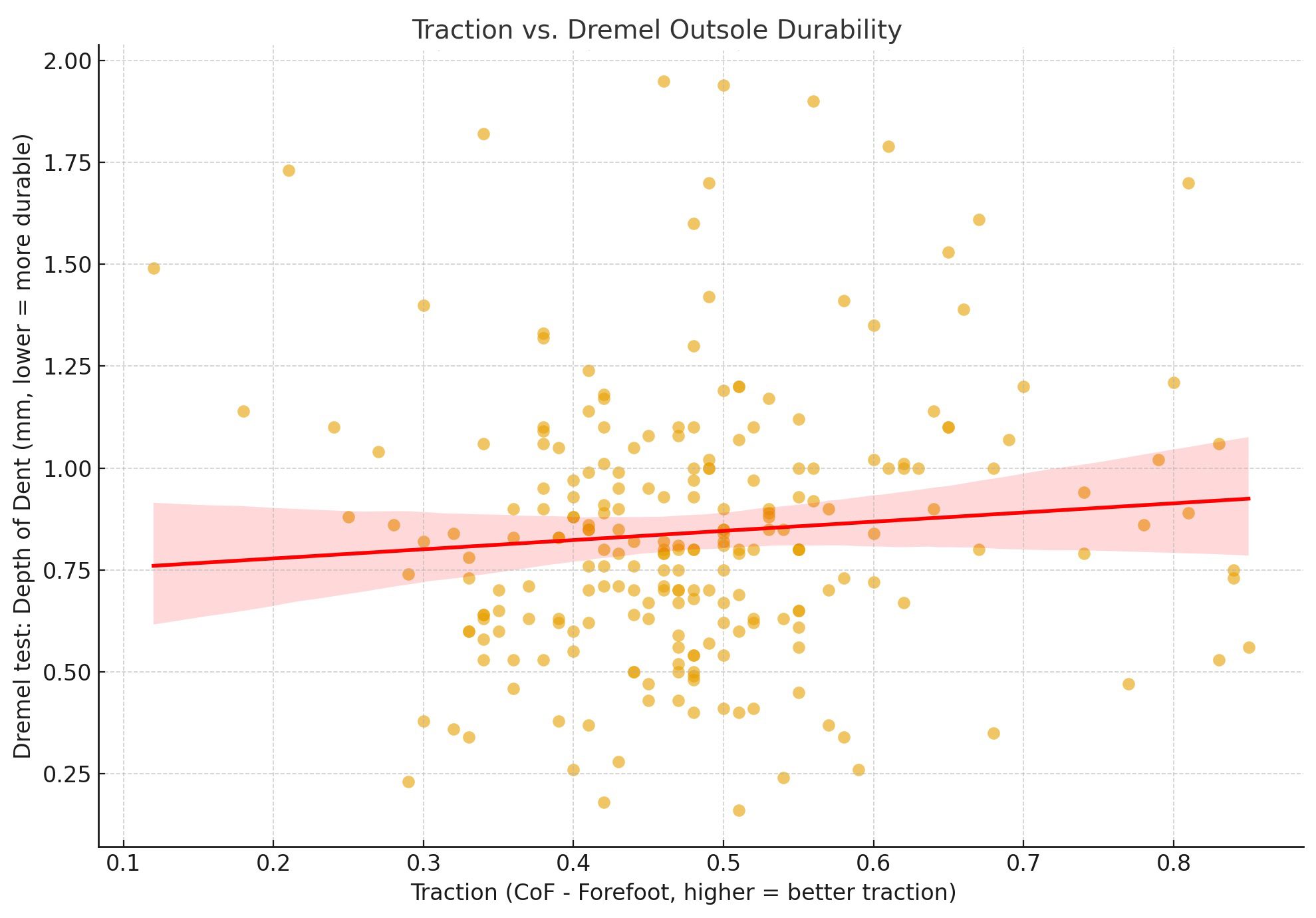
Premium compounds like Continental or ASICSGRIP use advanced polymers that deliver strong grip while remaining highly durable, whereas budget models often rely on cheaper blends that wear down and lose traction quickly. Outsole coverage also plays a key role, as shoes with wider rubber zones provide more surface contact and better grip. In short, traction depends less on durability and more on smart material engineering and outsole design.
And sure, shoe manufacturers could improve durability just by increasing the thickness of the rubber, right? For example, the Saucony Endorphin Elite 2 has a 1.2-mm thick rubber, while the Brooks Beast GTS 24 has 4.8 mm. Unfortunately, that's not an option for supershoes, as this would add too much weight, which is a crucial factor for performance as proven by this meta-analysis.
The mystery behind outsole wear
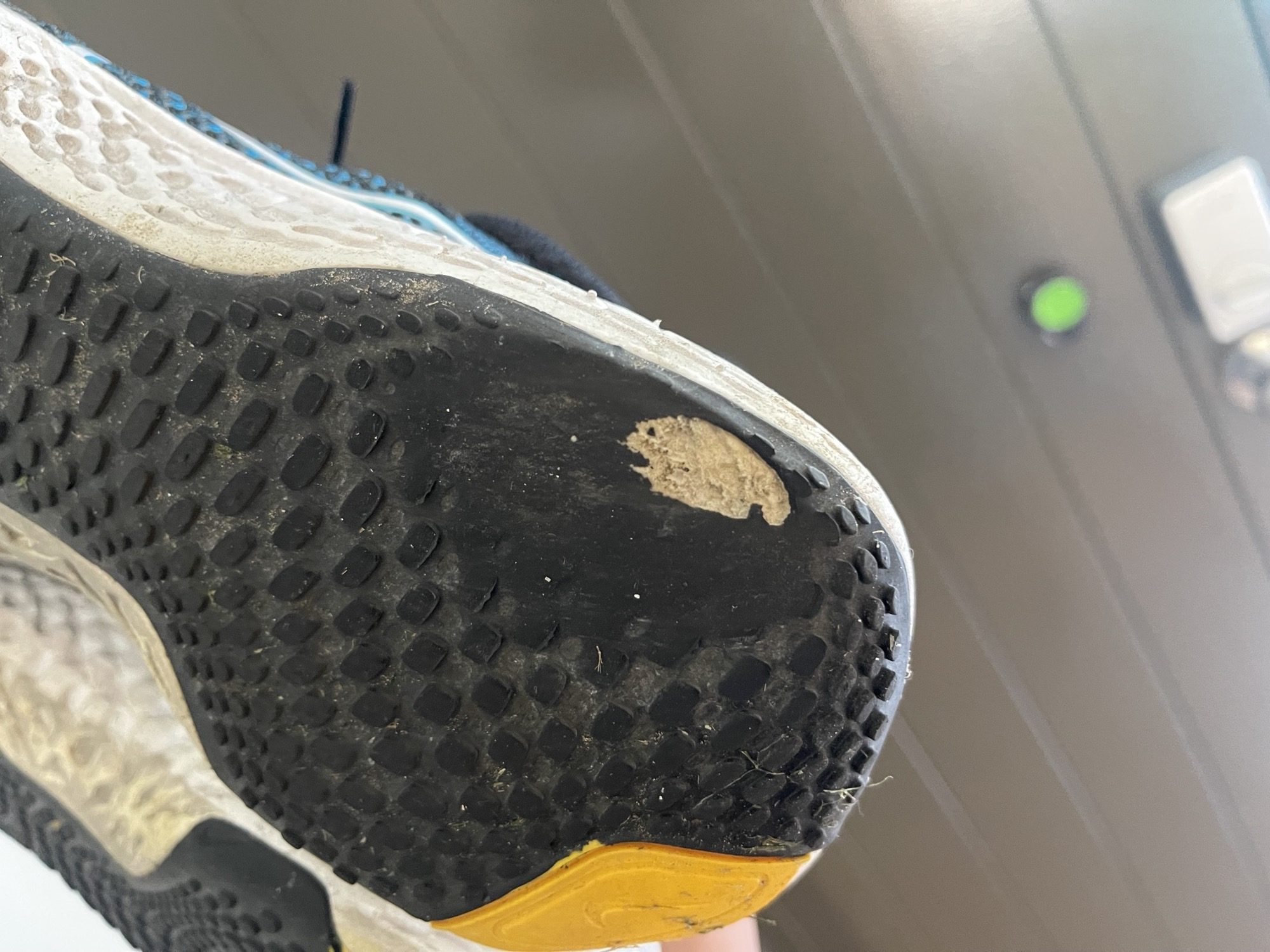
Excessive wear in Nike Invincible after only 120 kilometers. Source: Reddit
This is a common issue in the world of running shoes. Perhaps you and a friend bought the same pair of shoes, ran together most days, but while one person's outsole still looks brand new, the other person's outsole is already showing the foam beneath the rubber. How does this happen?
Well, there are several factors that influence outsole wear:
| Factor | Impact level | Explanation |
| Foot strike | Medium | Runners who tend to strike their heels wear out their outsoles faster than those who land on their midfoot or forefoot. Most runners are heel strikers, as proven by this study. |
| Weight | High | The higher the weight, the faster the wear under the same conditions, as the shoe has to withstand greater stress. |
| Temperature | Low | Higher ambient temperatures lead to faster outsole degradation. |
| Weather | Medium | Running on wet surfaces reduces wear-and-tear on the outsole. |
| Pronation | Very high | The angle of your foot strike and lift-off greatly affects the rate of outsole wear. This is because you may put more stress on a smaller area of the outsole. |
| Surface | Medium | Surfaces can have different effects on outsoles. For instance, a treadmill has little impact on the outsole, but tarmac can be tough on the rubber. |
| Rubber / Foam | Very high | The quality of the rubber and the materials used in the outsole can also affect wear. Better or harder rubber results in greater durability. Similarly, if the shoe has exposed foam that is not abrasion-resistant, it will wear more quickly. |
| Running technique | Medium | Stride length, running cadence, and foot placement contribute to the overall wear pattern on the outsole. |
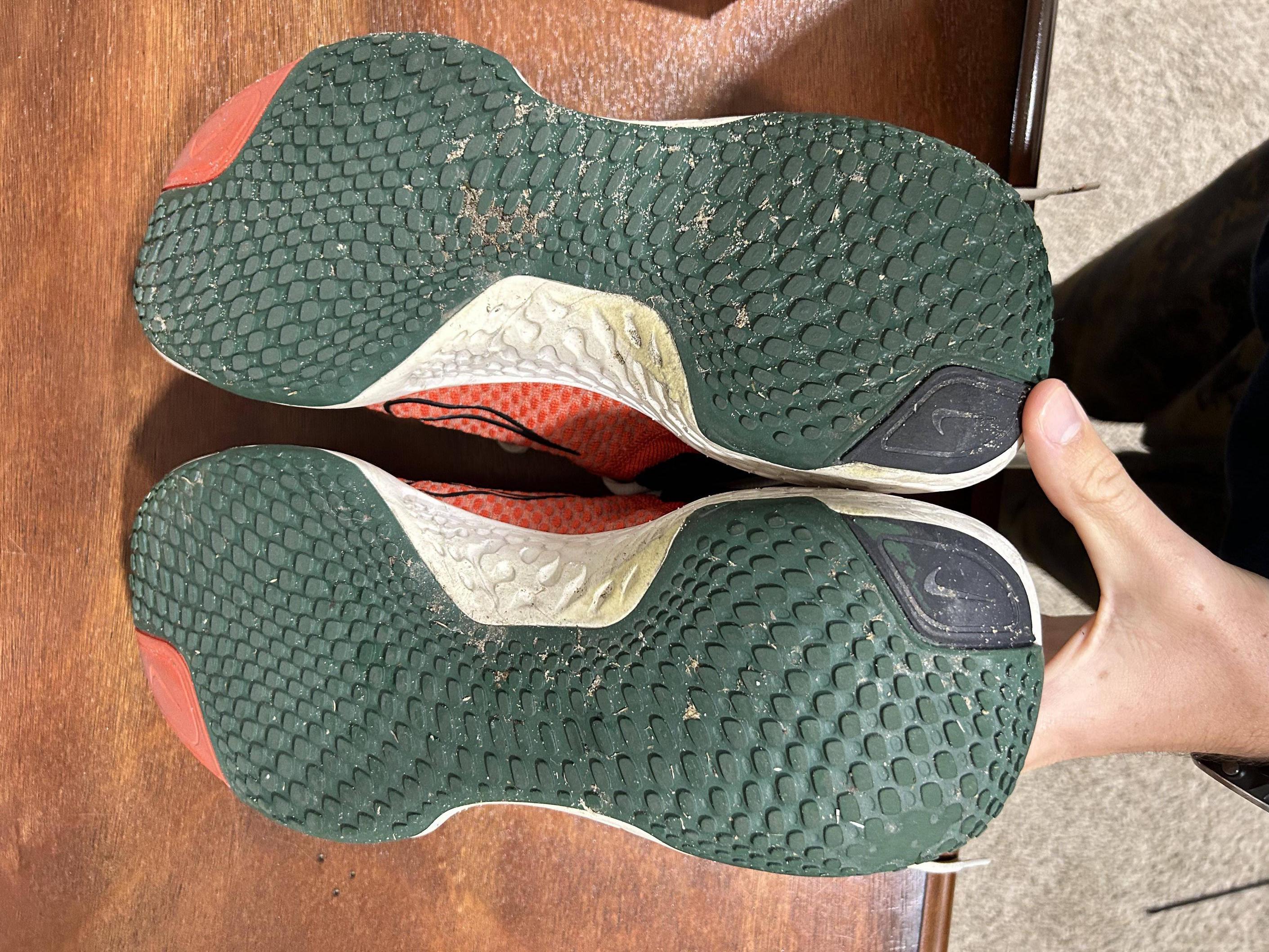
Absolutely normal wear in Nike Invincible after +500 km. Source: Reddit
In addition, it's completely normal to have uneven wear on the outsoles, which can range from subtle to very noticeable.
Your feet are naturally different from each other, and you may even have one leg slightly shorter than the other. These factors contribute to the asymmetrical wear pattern.
Tire companies and running outsoles: Is it all about marketing?
One of the most remarkable success stories in the partnership between two vastly different companies is the collaboration between Adidas and Continental. Over a decade ago, these two German giants joined forces, sparking a revolution in the running shoe market. Since then, Adidas has launched more than 250 different models equipped with high-performance Continental rubber.
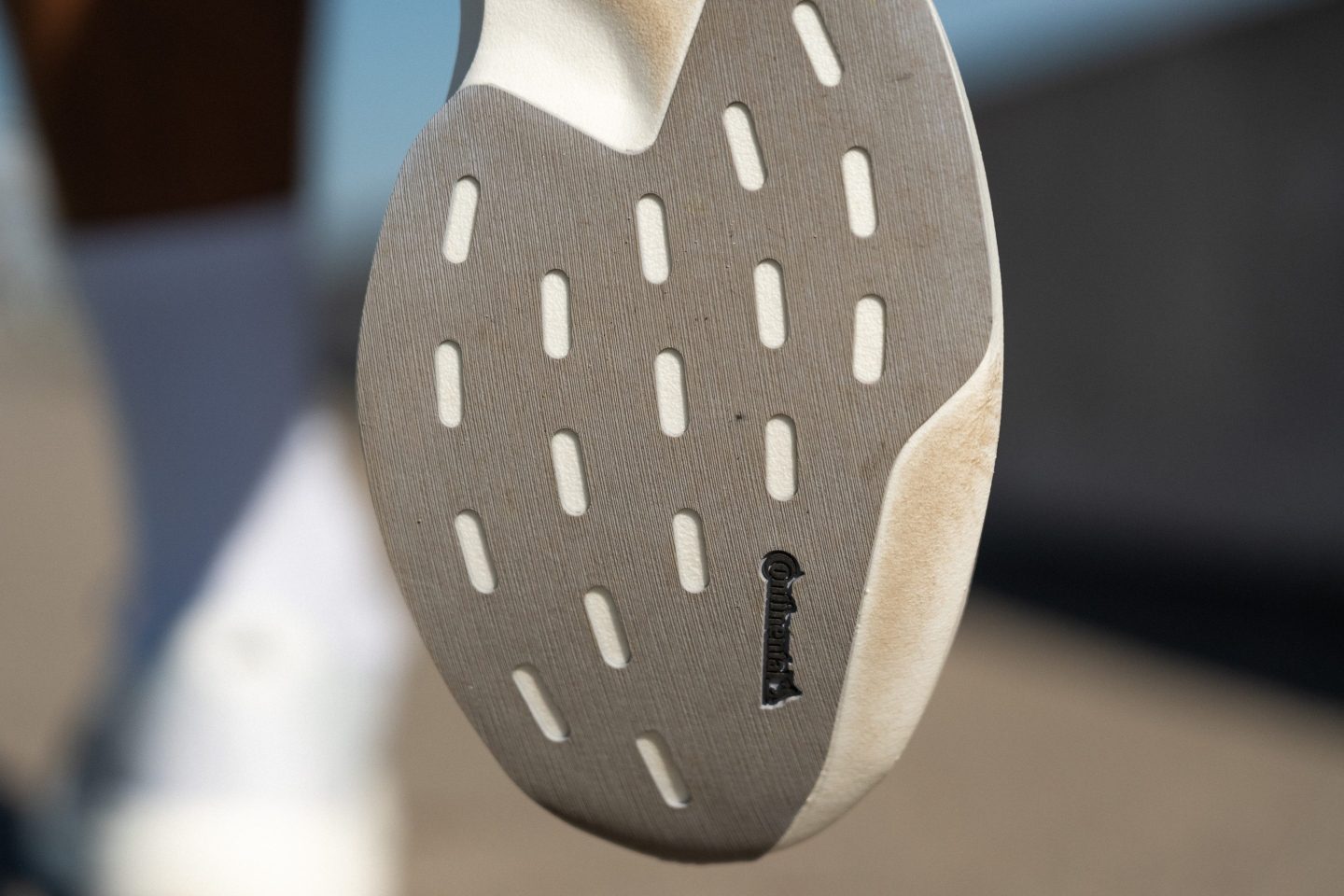
The deal made complete sense. Each company focused on what they do best, period. The success of this collaboration has been remarkable, prompting other brands to follow suit. In fact, it worked so astonishingly well that more brands joined the bandwagon:
- Under Armour + Michelin
- Mizuno + Michelin
- Skechers + Goodyear
- Puma + Pirelli
- Vibram + Hankook
In summary: The importance of partnerships between running shoe brands and top tire manufacturers cannot be overstated. These collaborations have proven to be more than just marketing tactics. And this success paves the way for other running brands to seek out similar partnerships with renowned tire manufacturers like Bridgestone and Toyo.
Pros and cons of rubberized outsoles
A rubberized outsole, as used in shoes like the ASICS Gel Cumulus 26, features a blend of EVA foam and rubber instead of just rubber. Each year, more shoes are adopting this type of outsole, so understanding its advantages and disadvantages could be crucial for you.
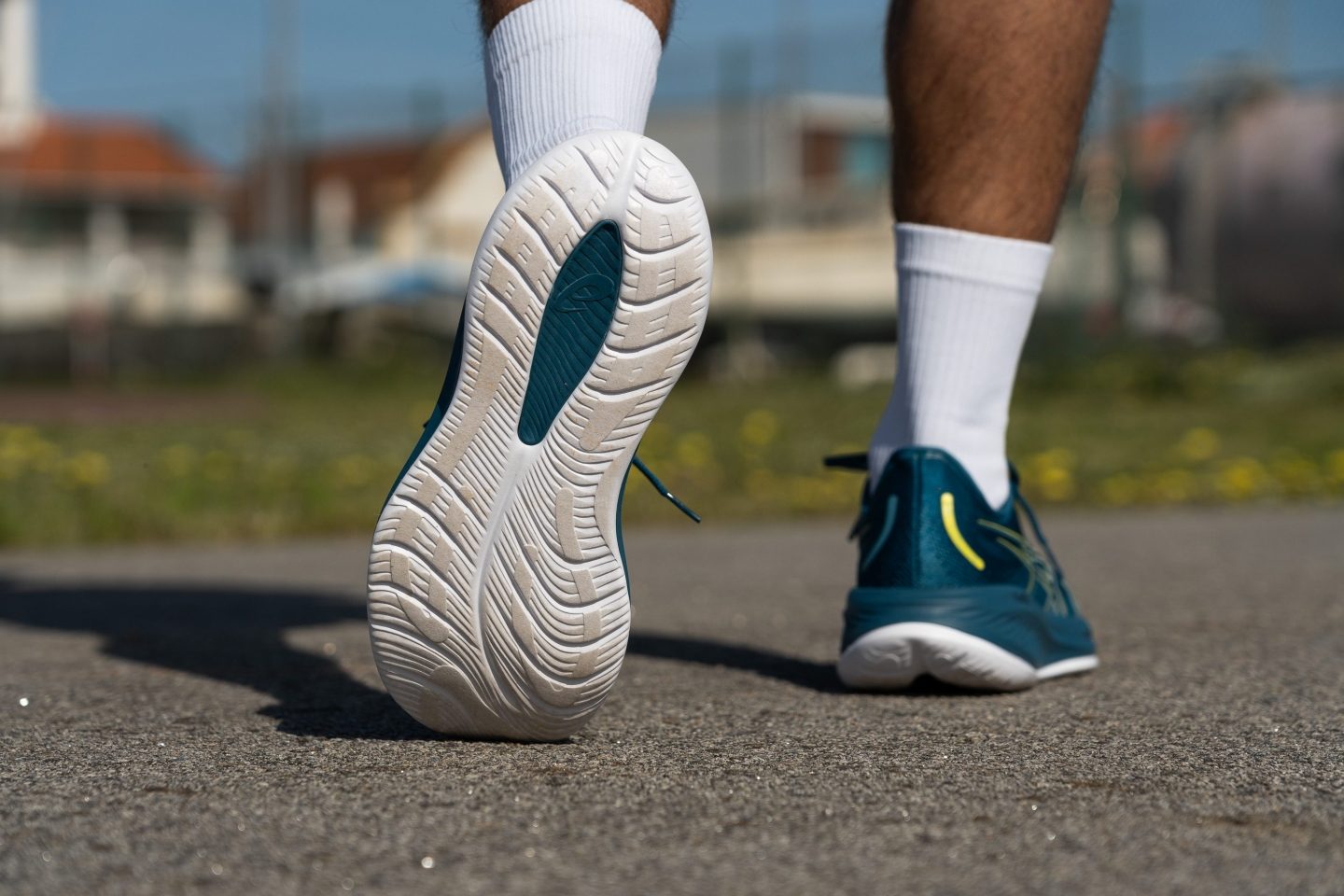
In our view, the most significant benefit of a rubberized outsole is the enhanced running feel. By replacing hard rubber with a softer EVA blend, landings become much softer and gentler, also resulting in a quieter ride. Additionally, these outsoles tend to be lighter while still maintaining good cushioning.
However, rubberized outsoles come with some drawbacks. If they were perfect, they'd be more widespread—yet, less than 5% of running shoes feature them. The primary issue is durability, which is noticeably reduced, although some brands try to compensate by using thicker outsoles than usual.
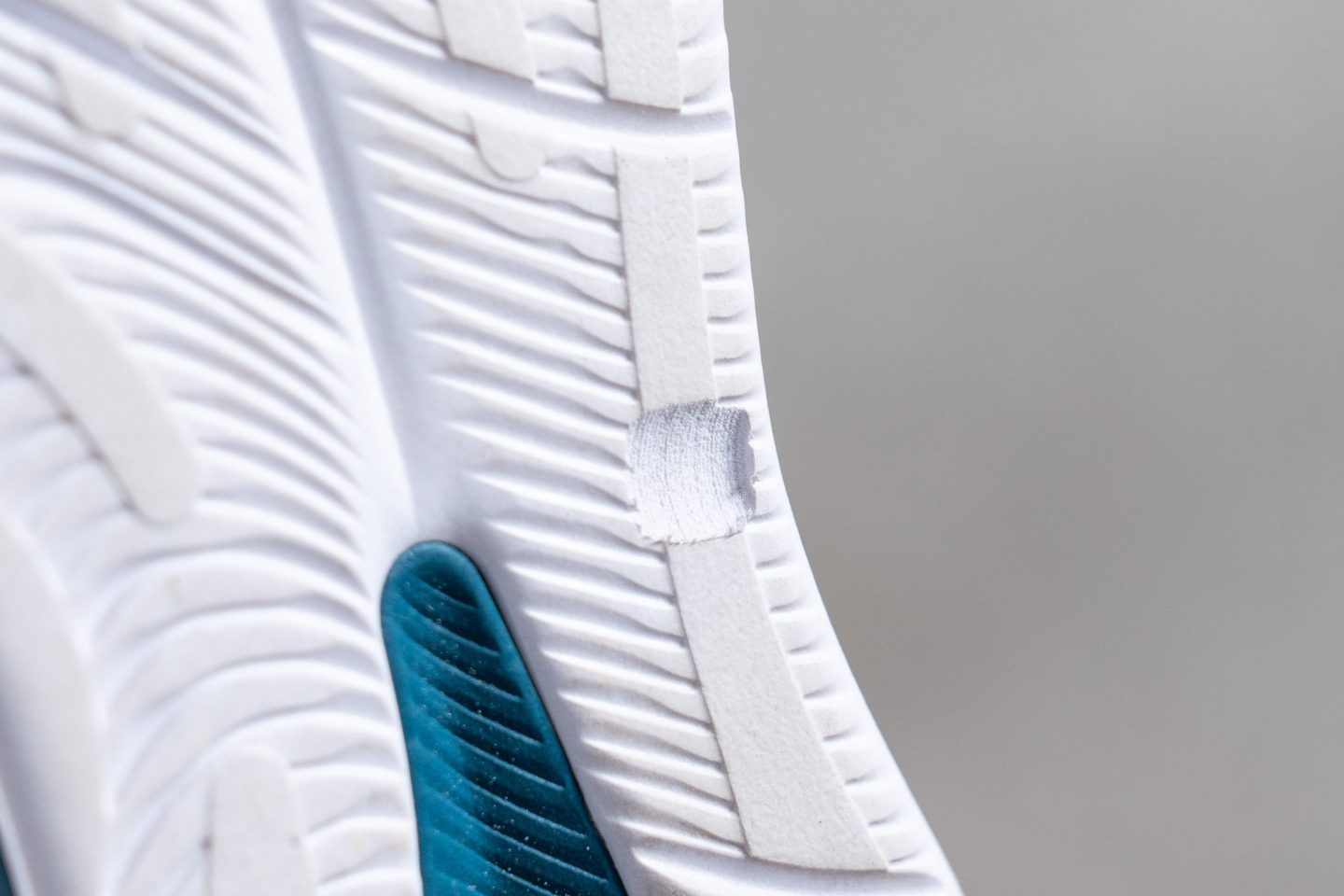
Another significant concern is grip, as we found rubberized outsoles do not perform as well as traditional ones on non-paved surfaces, reducing their versatility.
In summary, for runners who don't typically wear through outsoles quickly and value a soft, quiet ride, rubberized outsoles can be ideal. However, most runners might find that a standard, hard-rubber outsole offers better overall performance.
Polyurethan: the future of outsoles?
In 2024, Adidas introduced the Adios Pro 4 with the all-new LIGHTTRAXION outsole, aiming to achieve something rare in the running shoe world: combining low weight, top-tier durability, and exceptional grip. After testing it, we can confidently say that PU (polyurethane) will become a major material in running shoes in the coming years.
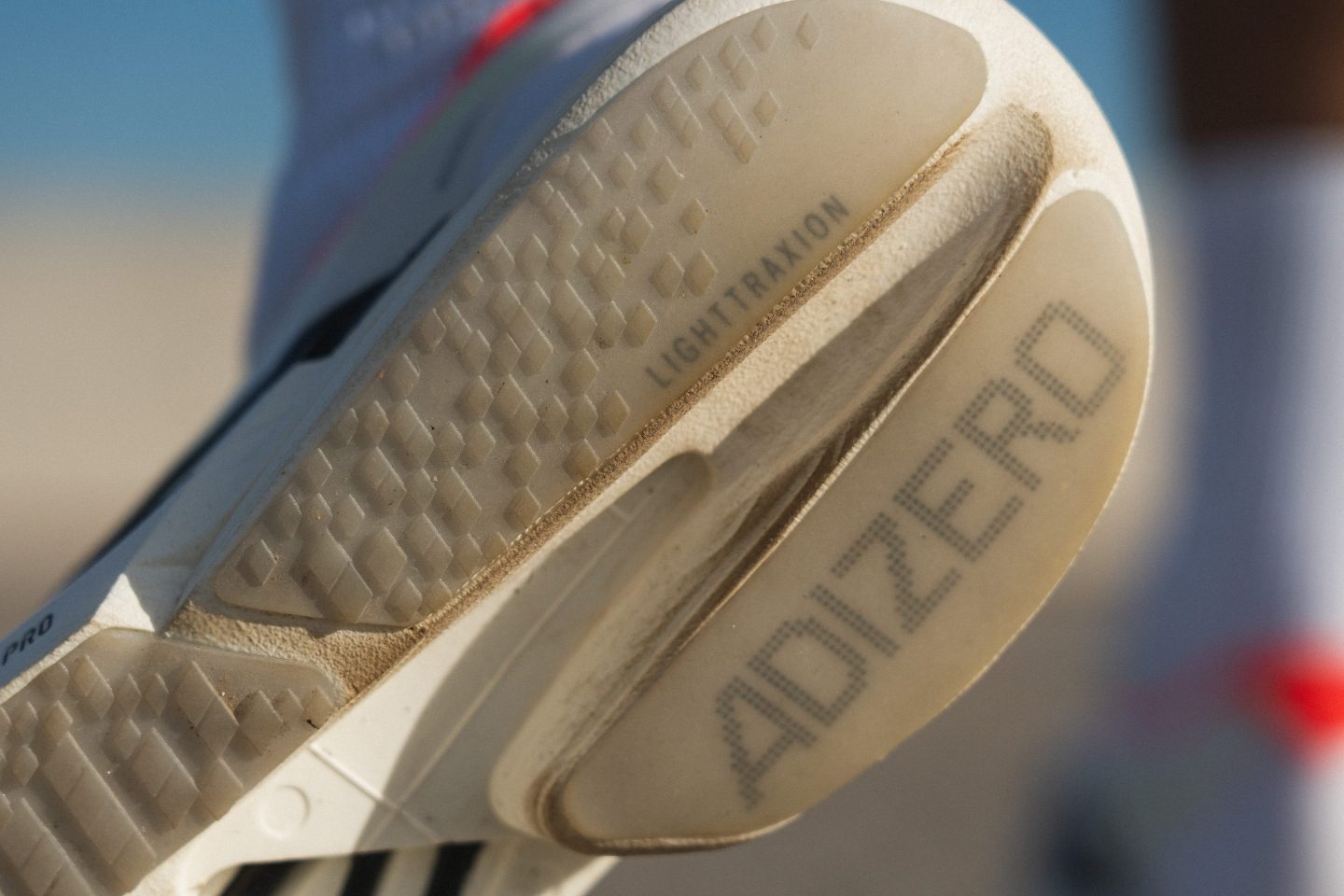
The primary advantage of this type of PU outsole (GCPU for the Adios Pro 4) lies in the precise combination of features we mentioned. This translucent outsole from the AP4 is significantly lighter than standard rubber, as grippy as the best compounds, and highly resistant to abrasion.
So why isn’t it widely used yet? The reason is twofold: PU outsoles are exponentially harder to manufacture, making them more expensive, and the materials are less recyclable, raising environmental concerns. As of early 2025, only a handful of Adidas shoes feature this outsole, but trust us—you’ll see it more frequently in the future, especially in premium models.
Symmetry vs. asymmetry: Comparing heel outsole designs
In recent years, we have noticed a growing trend in running shoes featuring rounded heels for their outsoles. But what does this mean?
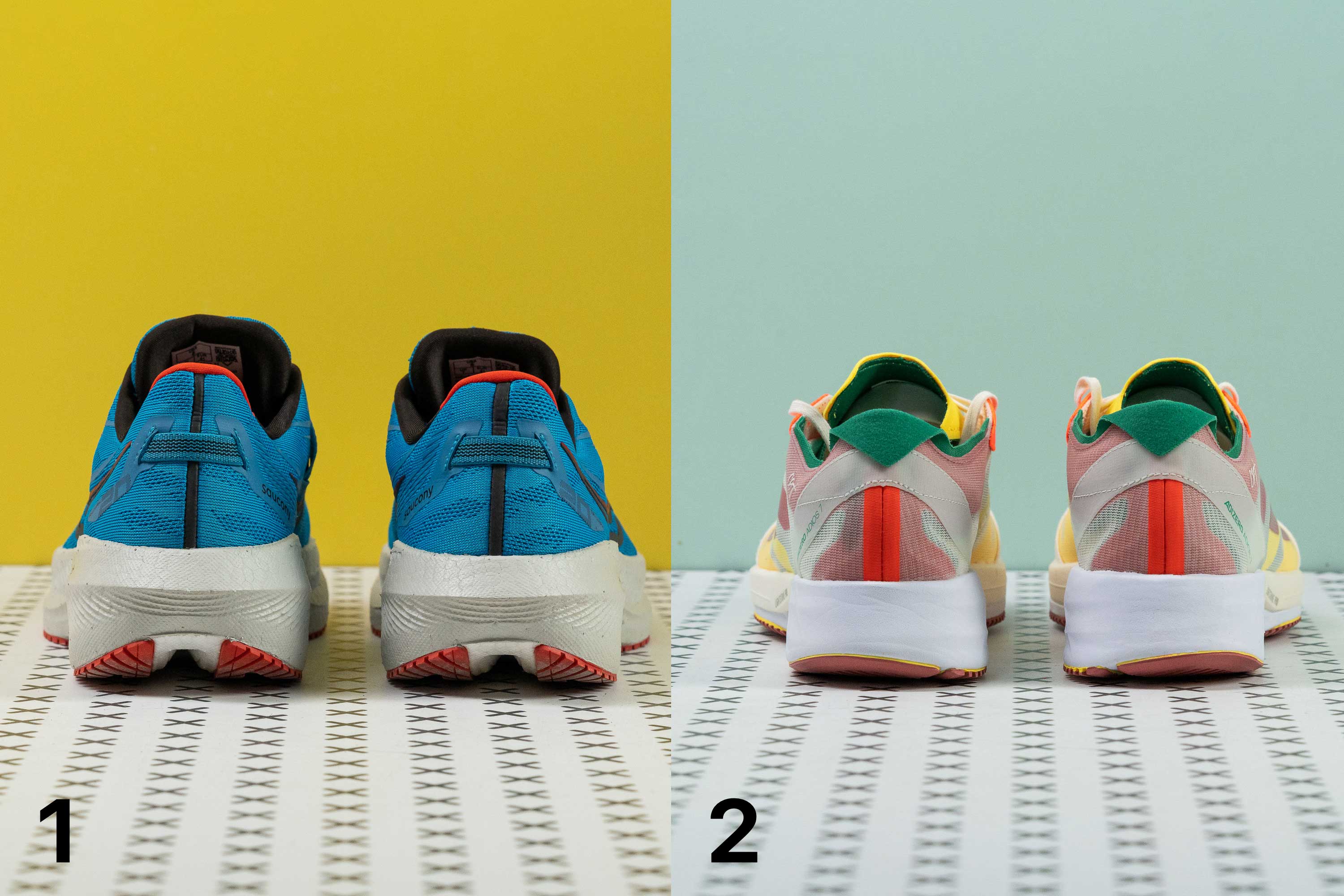
A 2021 study suggests that rounded outsoles can have a positive impact on biomechanics and comfort. While this may be true for some runners, in our experience, it seems to benefit neutral runners more. For individuals with pronation issues, a symmetrical pattern with a non-rounded heel is often a better choice.
Hybrid running shoes
In our in-depth guide of running shoe uppers, we highlighted hybrid shoes as an excellent option for those who prioritize durability. Now, we're going to advocate for them once again, because they just might be the perfect choice if you find yourself in the following situations and want a shoe that can handle it all:
- You mix your runs between roads and trails, but your road shoes lack the necessary grip on the trails.
- You don't typically run on wet roads, where the lugs are terrible.
- You encounter small or sharp stones.
- You occasionally run over muddy sections during your runs.
- You need a shoe that offers exceptional durability.
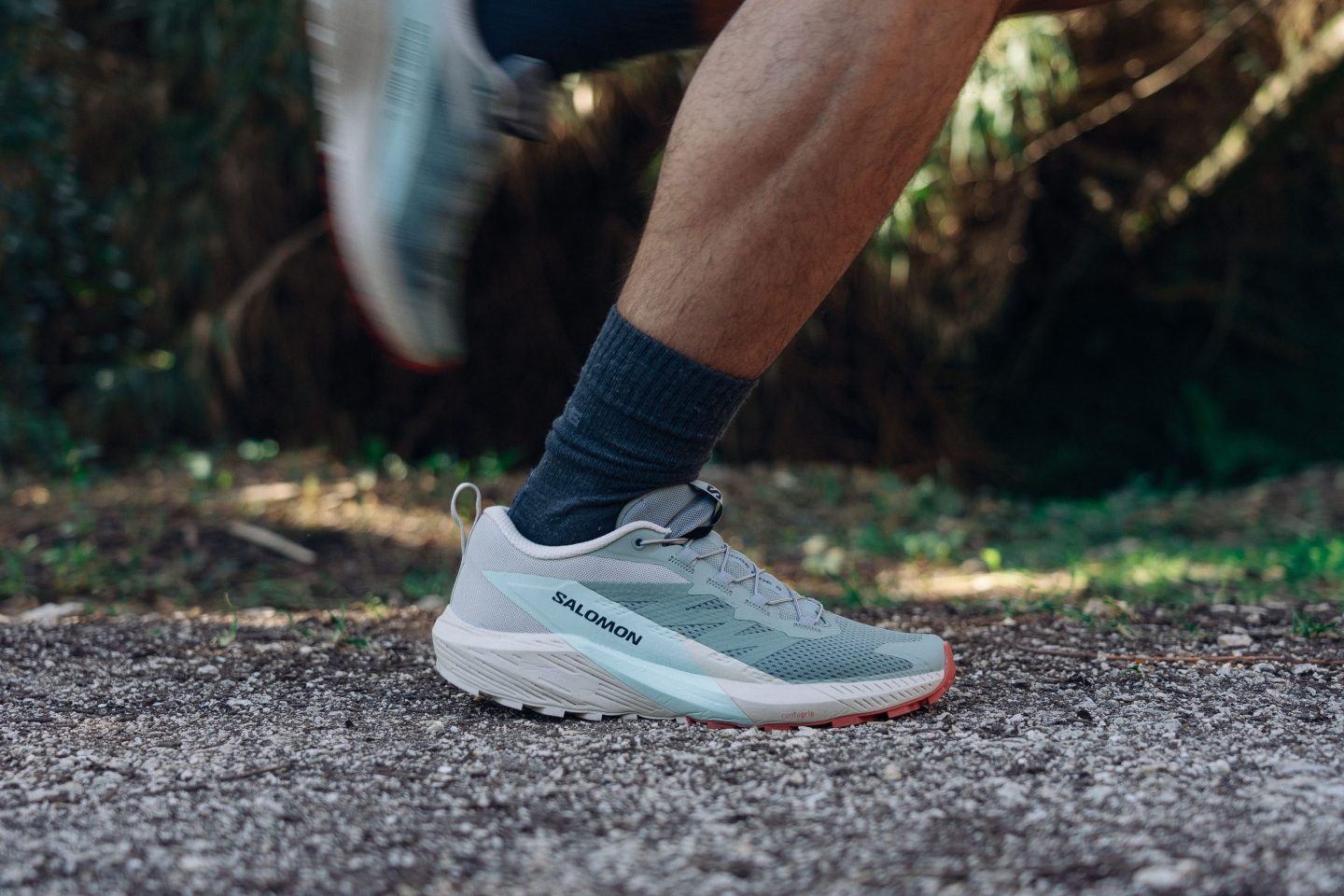
Hybrid shoes truly have the versatility and durability to tackle these scenarios head-on. To find them, just search for trail shoes with shallow lugs that are always below 3 mm. Three examples of great hybrid trail-to-road shoes are:
Understanding trail running outsoles
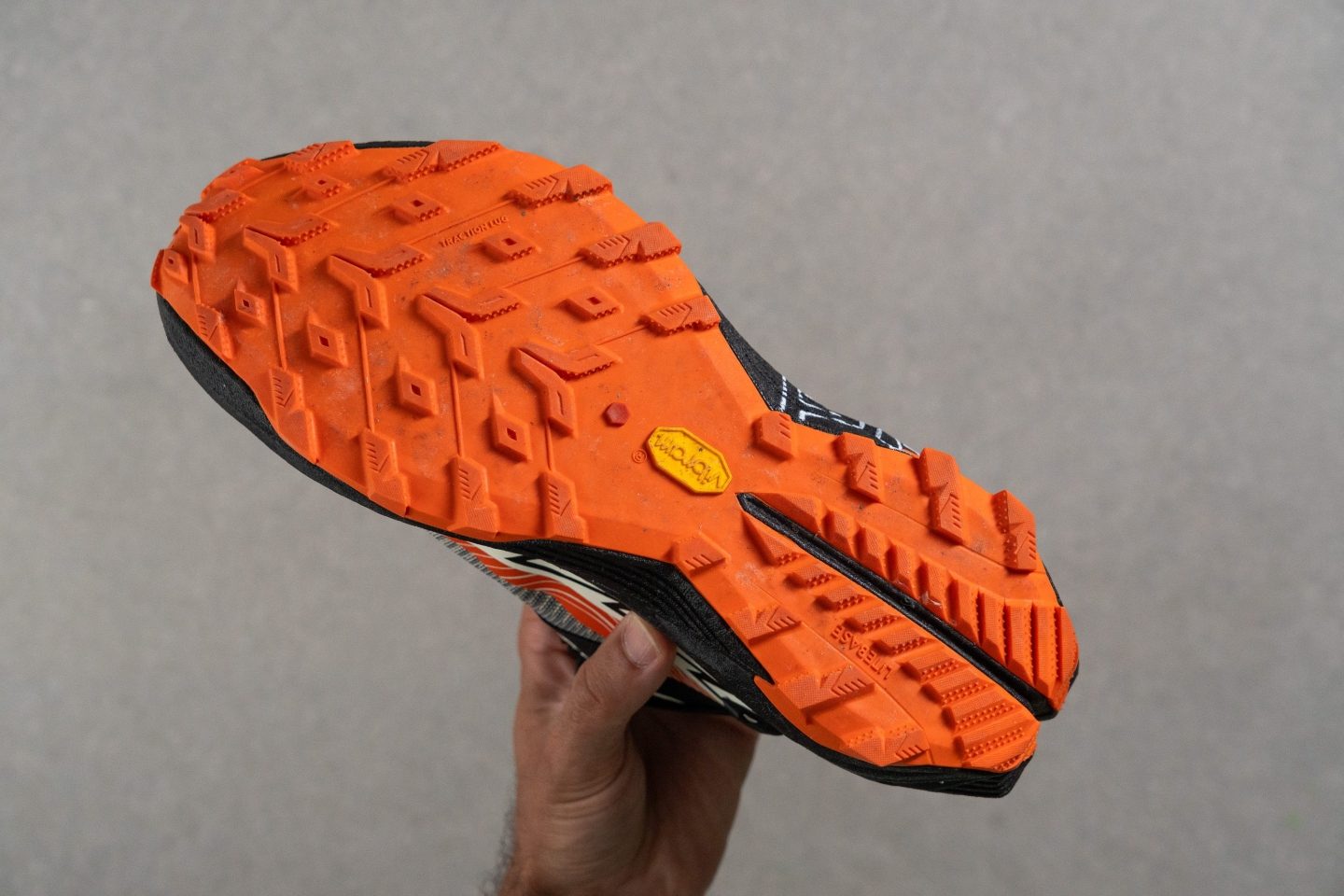
Road runners are all like, "Yeah, the outsole matters," but trail runners—they go absolutely bananas over it! That’s because when you're out there running on those mountain trails, traction becomes the holy grail.
While most trail runners focus on the stickiness of the rubber, that’s just one part of traction. Even if the outsole rubber is super sticky, it won't help you much in deep mud if the lugs are only 2 mm deep and super close. On the flip side, if the lugs are deep, like around 5 mm, they might not be the best for a hard-and-fast trail.
Furthermore, the subjective perspective on grip is also of great significance, as highlighted in this study. It recognizes that both individual perception and personal experience with traction play a vital role alongside objective data.
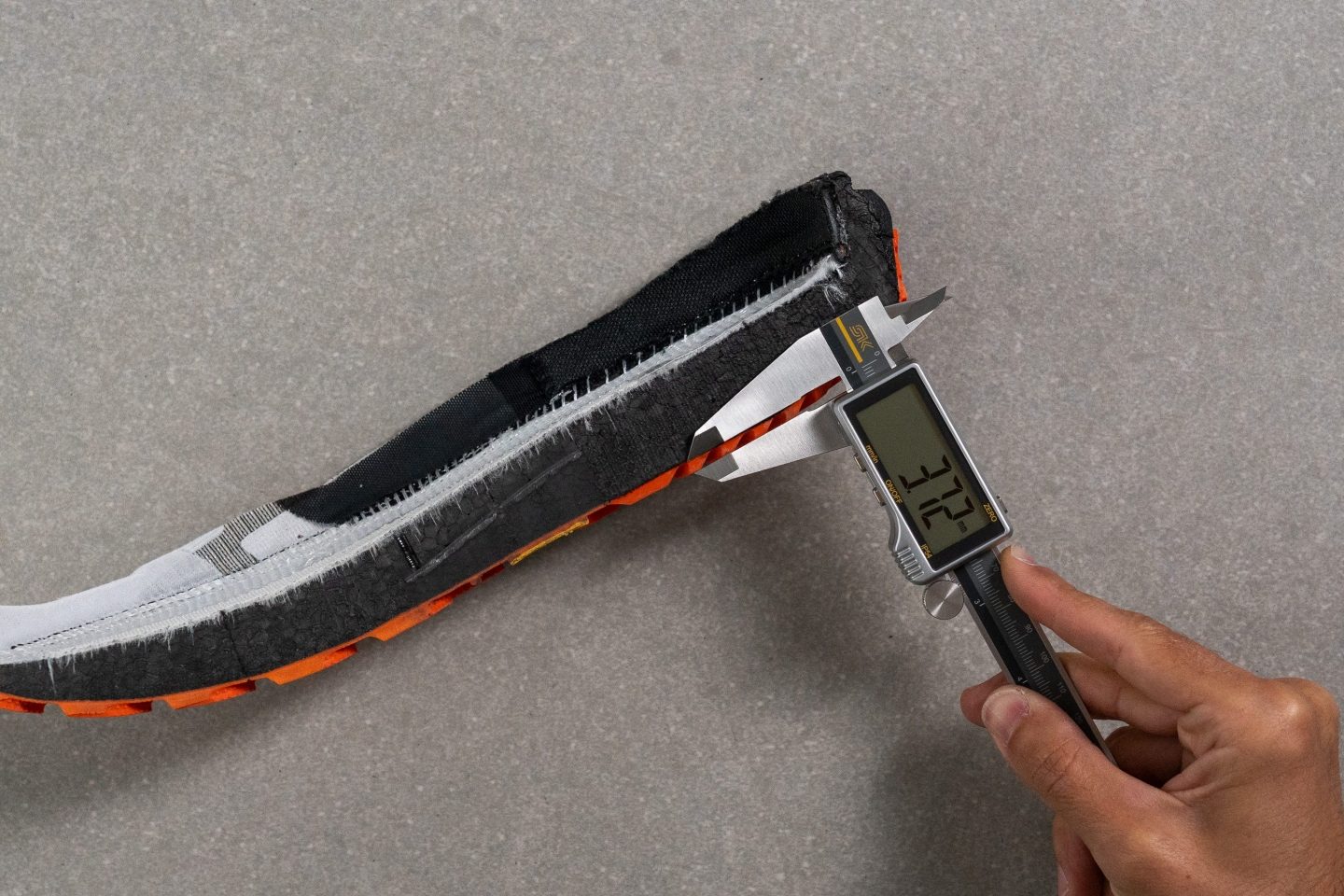
So, the key is to find a trail shoe that fits comfortably, feels great, and suits the specific conditions of the trail you'll be running on. The terrain and conditions have a significant impact on choosing the perfect trail shoe for you.
Surface-specific lugs: choose the best for every surface
Lugs come in various forms, from big chunks of rubber to smaller patterns. They are specifically designed to enhance traction on slippery surfaces by digging into the ground. With their multi-directional design, they provide greater stability on uneven terrain.
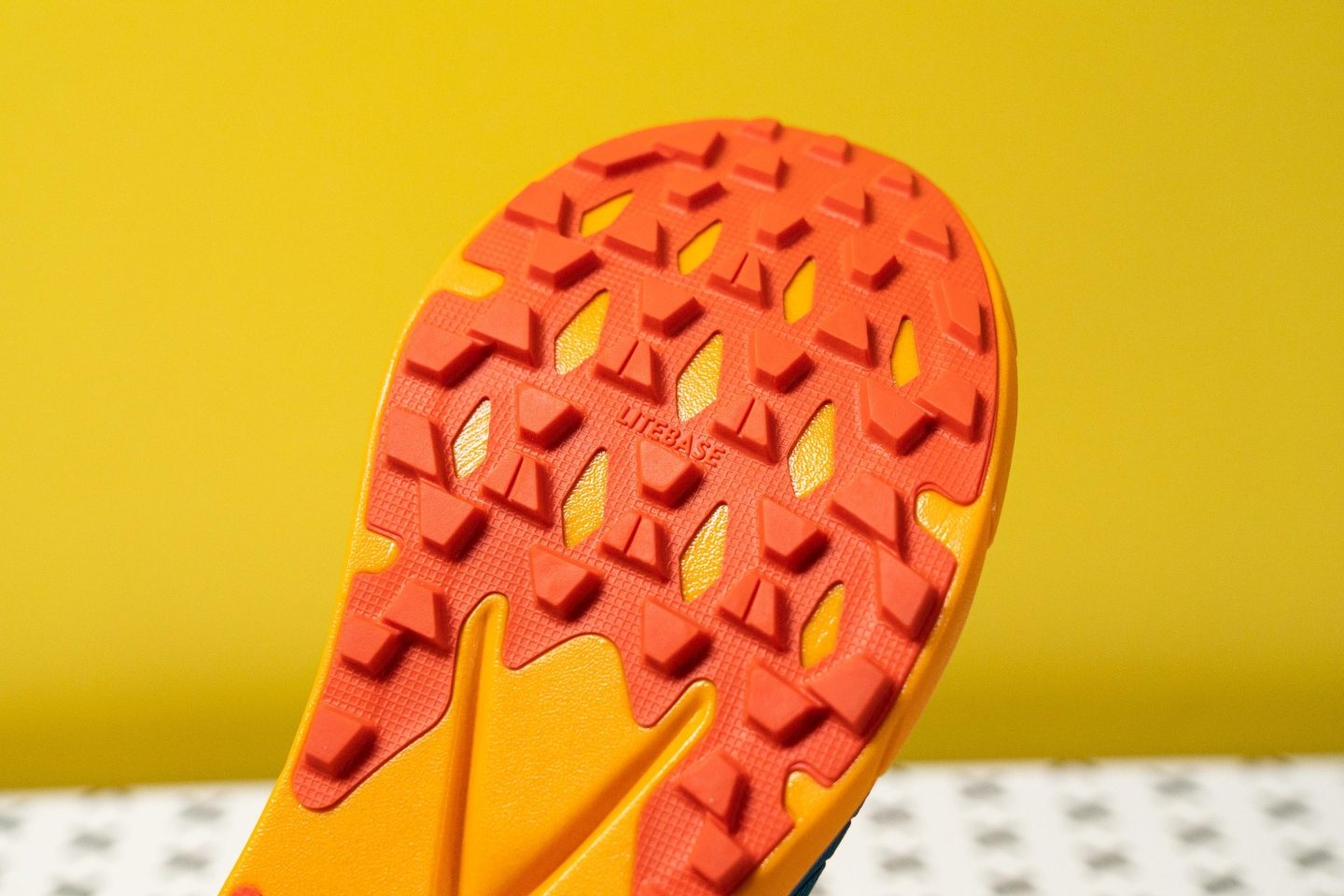
The choice of lug type depends on the type of surface you're running on:
- For softer surfaces like grass or mud, you'll need larger lugs with more space between them. This allows the shoe to effectively shed mud and debris.
- Uneven surfaces such as sand or trails with roots require lugs with varied angles and shapes. These lugs provide multidirectional grip, helping to prevent slips and falls.
- Easier trails made of gravel or dirt are best suited for shorter and simpler lugs. These lugs offer more flexibility and responsiveness on smoother surfaces.
Salomon is a running shoe manufacturer that focuses on creating trail running shoes for various surfaces. They specifically modify their proprietary Contagrip outsole to adapt to different terrains, as you can see below.
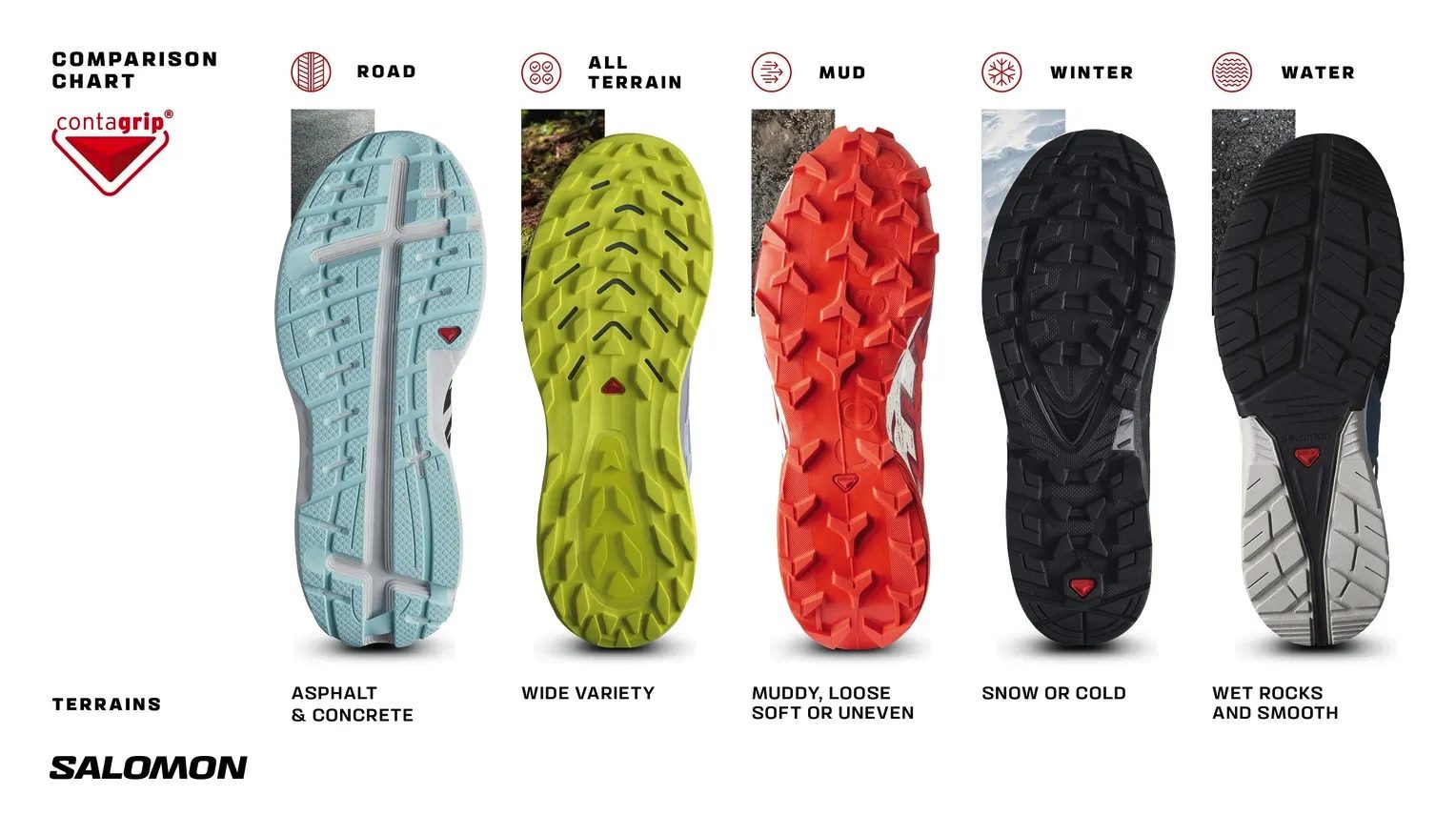
Trail width and outsole selection
Trails are typically categorized as either single track or double track. A single track trail offers enough space for one runner to run comfortably, while a double track can accommodate two runners or more.
When it comes to single track trails, you'll need a shoe that's agile, flexible and provides excellent grip. On the other hand, with double track trails, you can get away with less traction and more stiffness, so maybe you can try a carbon-fiber plated trail shoe, like the HOKA Tecton X 3 or the Nike Ultrafly.
Is it possible to replace an outsole in a running shoe?
If you're active on social media, you might have come across used running shoes with a brand-new outsole. How does that happen?
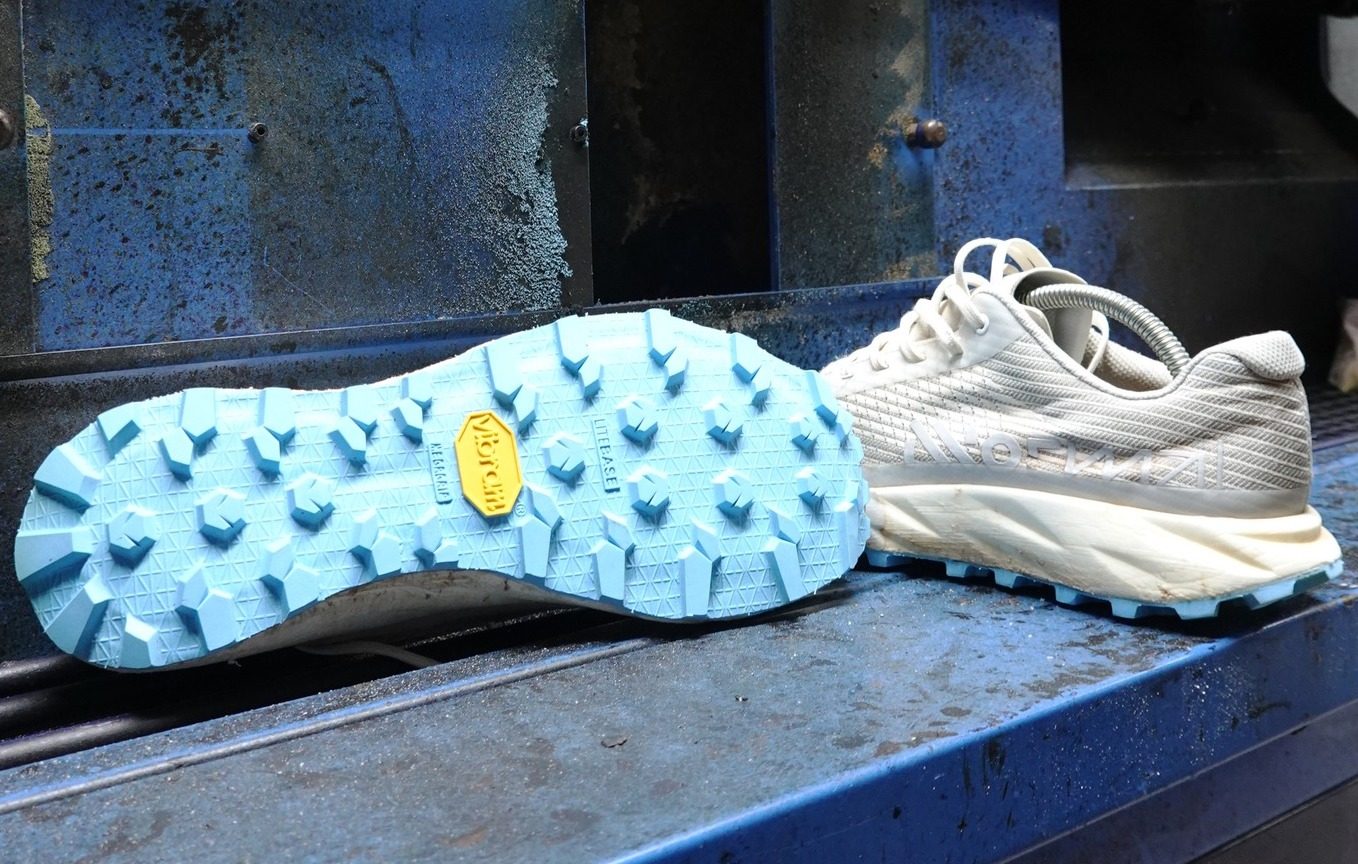
Some outsole manufacturers, like Vibram, sell outsoles to cobblers, who can then cut and adapt them for almost any shoe. Believe it or not, we've even seen Nike Vaporfly Next% shoes with a trail rubber sole in some races, although most of these modifications are done on trail running shoes because they tend to wear out faster.
While it's possible to ask your local cobbler to do this for you, or even use online shops that offer sole replacement services, there are 2 important things to consider:
- Each shoe is designed with a specific outsole in mind. If you put a heavier outsole on a shoe, it can alter the weight distribution and potentially cause issues like discomfort or even injuries.
- When you put a new sole on an old shoe, the midsole obviously keeps the same. So, we don't think it's the best idea to spend the money—usually between $40 and $80—for a shoe that already feels flat, but it can be a great option for shoes whose outsoles break prematurely after just a few hundred kilometers.
The weather factor
When running on roads, weather is by far the most important factor when it comes to the performance of an outsole.
In dry conditions, 99% of running shoe outsoles will deliver sufficient grip to have a secure ride. However, things change when the roads are wet because of rain, dew or snow—the outsole becomes the most important part of the shoe.
But how do you know which outsole is great for running on a wet surface? Well, you need to consider two things.
- Midsole coverage: if it’s wet, you want to have as much rubber as possible. Exposed foam it’s 99% of the time really slippery on roads and especially on sidewalks.
- Rubber tread: you need to use a shoe with grooves or channels in the tread pattern that help to disperse water and provide better grip on wet surfaces. The more water in the road, the more channels you want to have in the shoe.
Top-grip outsoles in road running shoes
The traction performance of a road running shoe is influenced by two main factors: the real contact area and the structure of the outsole tread design, as suggested by this study.
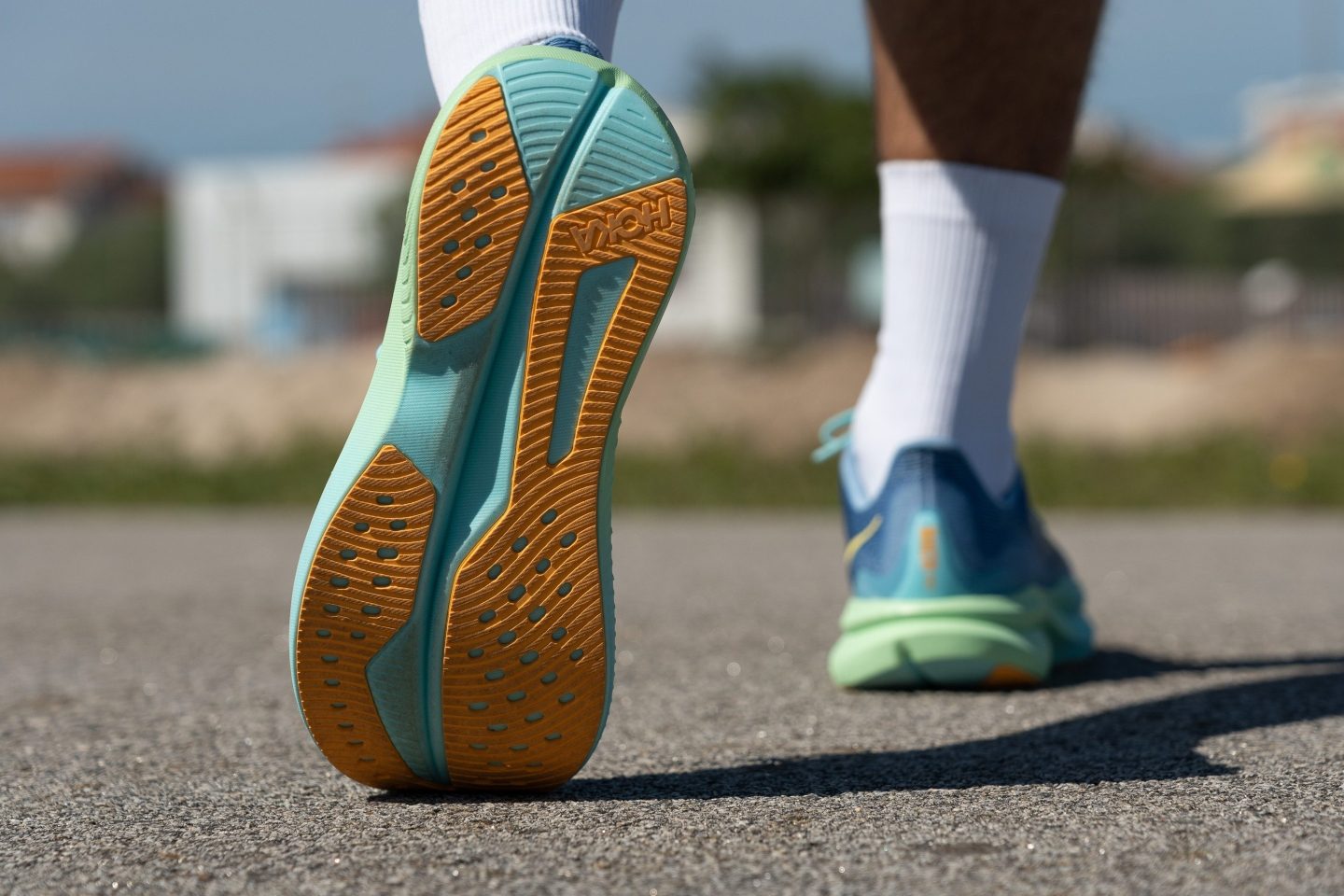
Consequently, if you exclusively run on roads or soft trails and prioritize maximum grip, here are 2 outsoles that work wonders:
- PumaGrip: When Puma re-entered the running shoe market, they made sure to excel in the grip department, and they succeeded. PumaGrip provides an impressive level of traction, clinging to the ground like claws, while also offering decent durability. A good example is the PUMA Velocity Nitro 4.
- ASICSGRIP: This compound from ASICS is a true standout. Almost every shoe equipped with this rubber ranks among the best in our lab tests, with models like the Gel Nimbus 27 and Gel Kayano 32 showcasing its exceptional balance of grip and durability.
Are Nike outsoles so terrible in wet conditions?
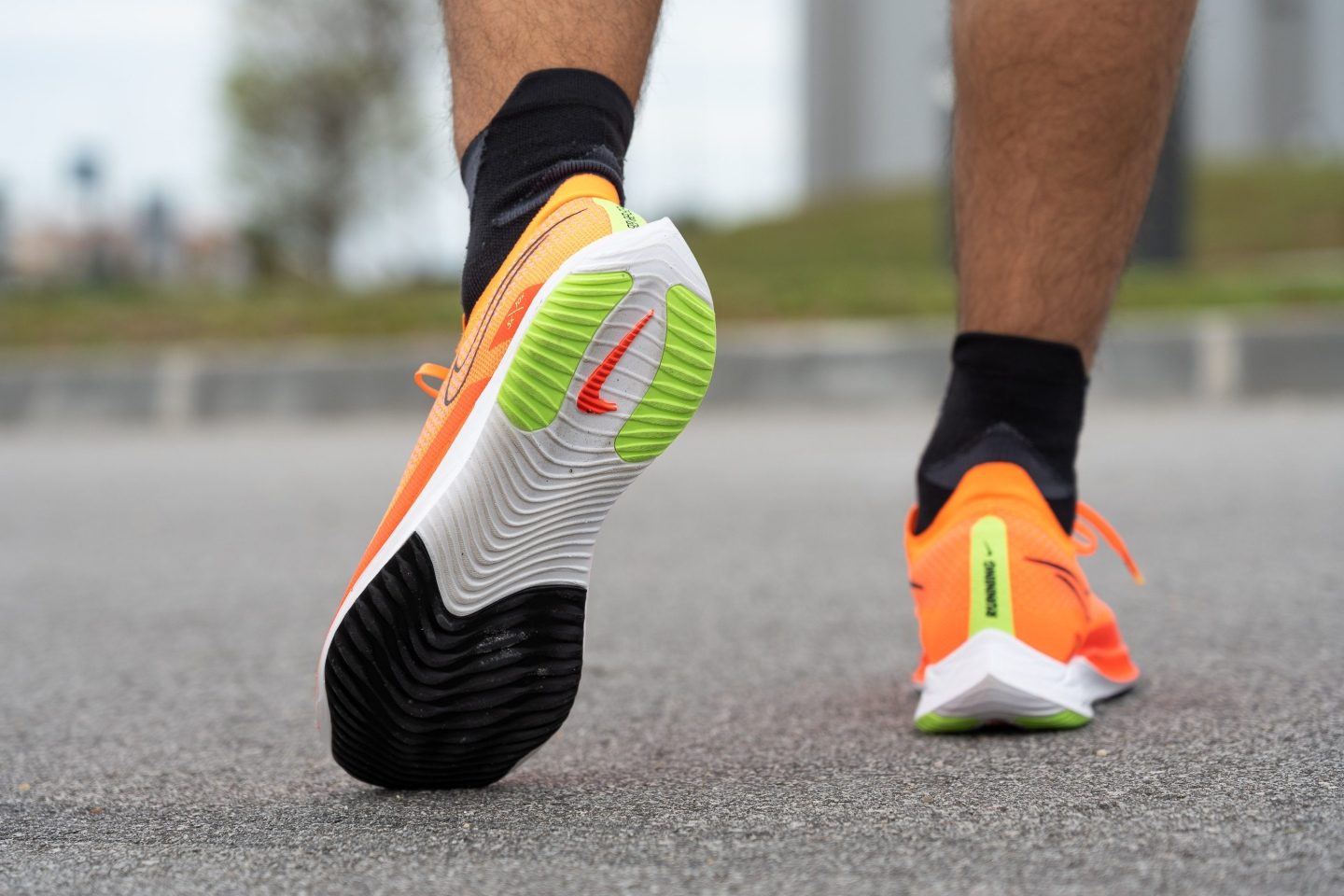
Undoubtedly, there's a common belief that Nike outsoles perform poorly in rainy conditions. But, is it true? Based on our own tests and numerous testimonials, we can conclude that while some Nike running shoes, exhibit disappointing grip in the rain, it's not fair to generalize this to all Nike shoes.
Take the Pegasus line, arguably one of the best-selling running shoes ever. In our lab, the Pegasus 41 performed poorly in the SATRA TM144 traction test, scoring just 0.25, which is about half the lab average and placing it in the bottom 20%. In contrast, the Vomero Plus reached 0.42, and the Streakfly 2 achieved a solid 0.49, showing that some of Nike’s new compounds are starting to move in the right direction.
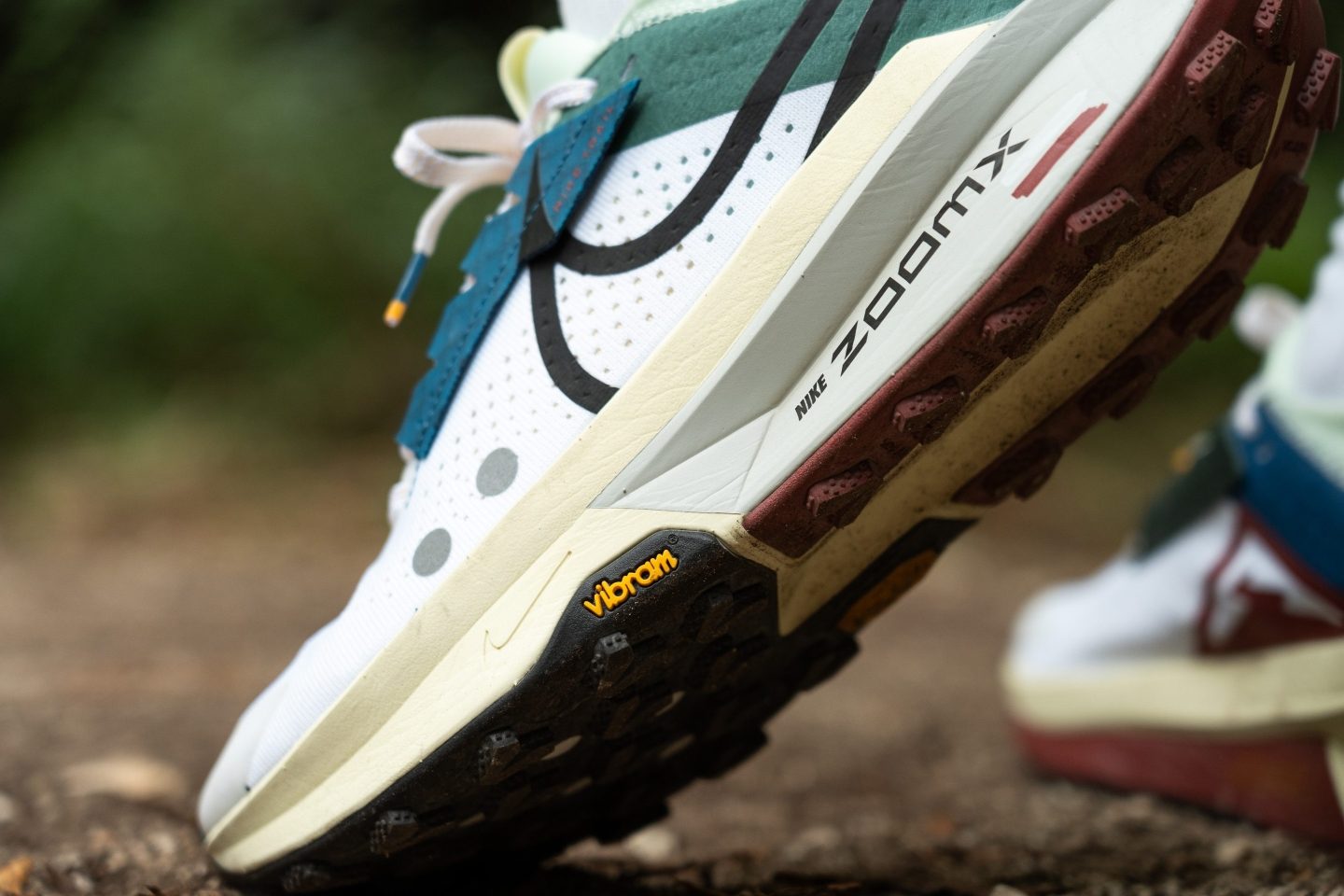
Still, it's very clear to us that Nike lags behind brands like Adidas and ASICS when it comes to traction in road running shoes, probably one of its most evident weaknesses, alongside inconsistent quality control. On the bright side, the brand has finally partnered with Vibram for trail models like the Ultrafly and Zegama 2, a long-awaited collaboration that's finally real.
Interpreting outsole numbers: Insights from our lab
In our lab, we meticulously collect data on various aspects of running shoes, including specific features of the outsole. We delve into aspects such as traction, thickness, and lug depth, shedding light on how these factors contribute to overall shoe performance.
Traction
We’re constantly refining our testing methods to provide the most accurate insights into running shoes, and traction has always been one of the industry’s toughest challenges. While shoe reviewers usally rely on subjective impressions, we prefer hard data by comparing shoes under identical conditions to deliver fair, objective results.
That’s why we heavily invested in a specialized testing machine compliant with the SATRA TM144 standard, ensuring every shoe is evaluated equally. This approach has proven far more reliable than subjective feedback, helping runners make truly informed decisions.
The machine tests traction by sliding each shoe’s forefoot over a wet concrete tile in order to simulate challenging, real-world conditions. After all, most shoes perform well on dry roads, but rain can completely change the story.
Below is a list of 10 daily trainers with better outsole traction, accompanied by their respective readings:
Thickness
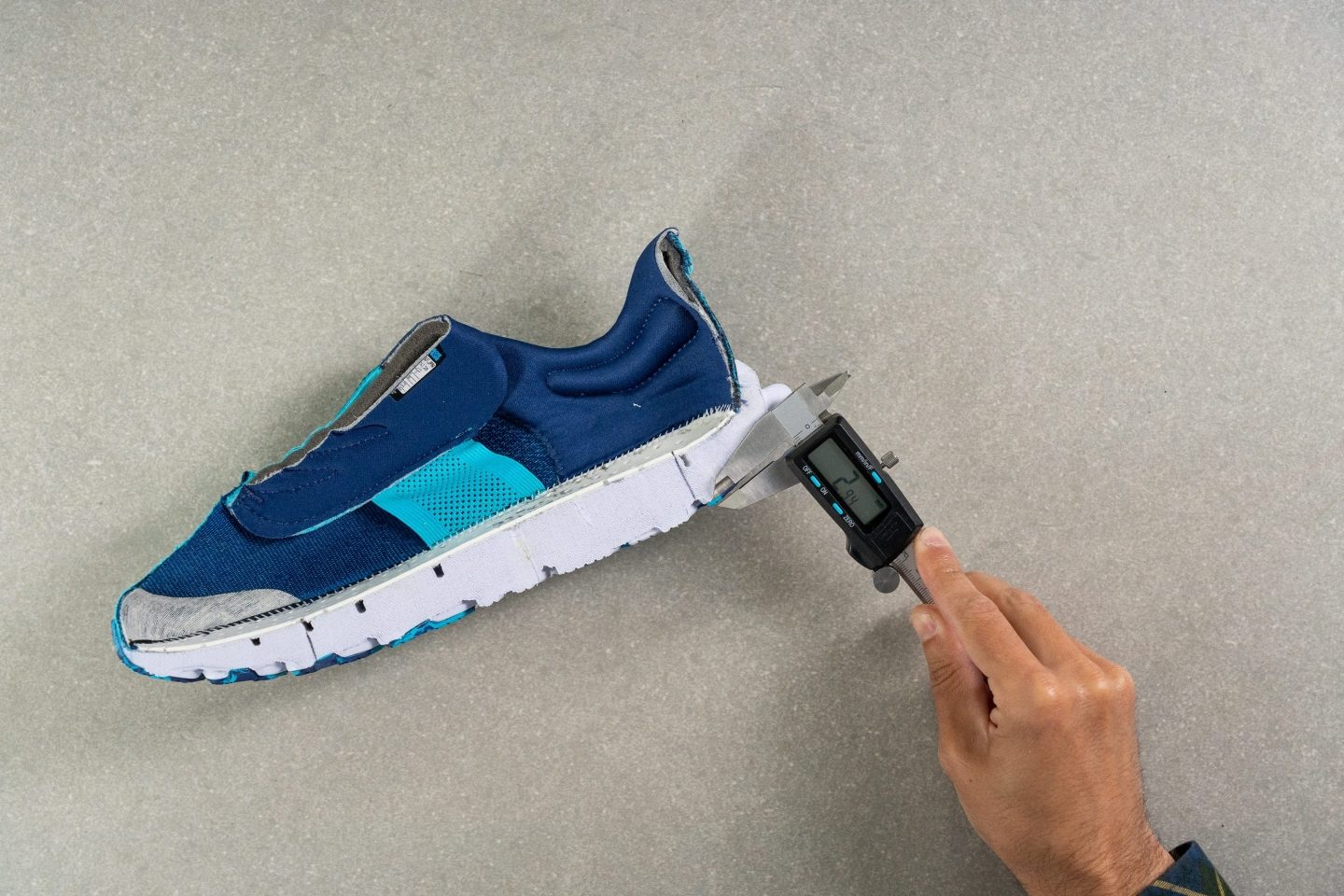
Outsole thickness plays a key role in its wear-and-tear resistance. Unsurprisingly, thicker rubber often means longer-lasting durability.
It's common to find running shoes designed for performance with a thin rubber layer, like the 2.0-mm rubber on the New Balance Fuelcell Supercomp Trainer, which aims to reduce weight. On the other hand, a durable daily trainer like the Saucony Axon 2 boasts 4.1-mm rubber, more than double the thickness of its racing counterpart.
Below is a list of popular running shoes featuring thick outsoles:
Lugs depth (trail running)
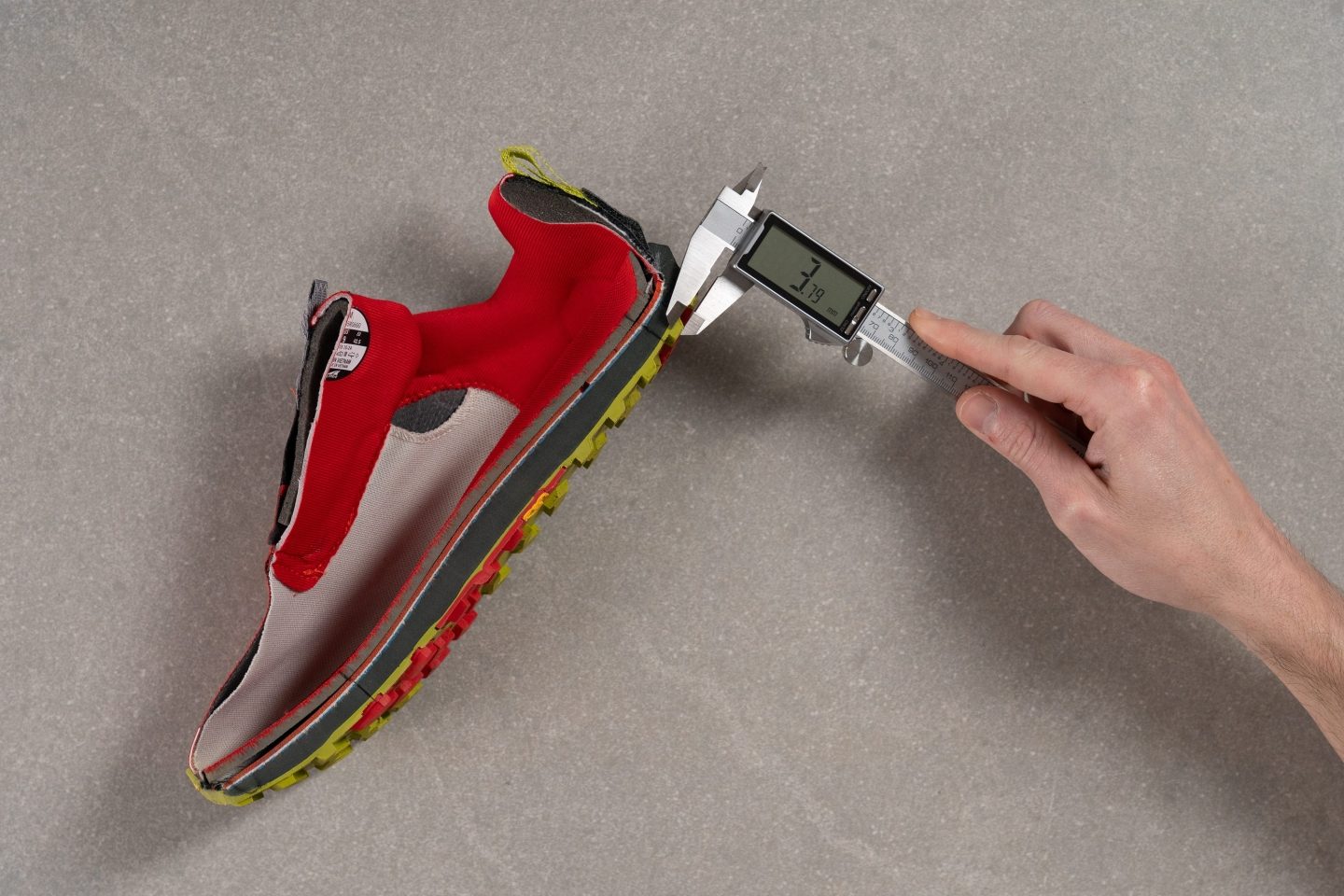
Lugs are crucial in trail running shoes as they provide the necessary traction on surfaces like grass, mud, dirt, or gravel. However, they are not suitable for road running and are therefore absent in most road shoes. Some daily trainers may feature lugs to perform adequately on light trails.
The average lug depth in our lab-tested shoes is 3.5 mm. Road-to-trail shoes typically have shorter lugs measuring less than 3 mm, such as the Salomon Ultra Glide 2 with 2.8 mm lugs. On the other hand, shoes designed for technical terrain or muddy conditions often exceed the 4 mm mark, like the Nike Wildhorse 7 with 4.2 mm lugs.
Here is a list of 10 of the most sought-after trail shoes, each with its corresponding lug depth:
Durability
We also measure outsole durability. Using a force of 2N and a 10K RPM speed, we grind each outsole with a fresh Dremel tip to ensure consistent results across all shoes.
Most models show wear between 0.5 mm and 1.2 mm, though some stand out—especially those with rubberized EVA foams, ultra-soft compounds, or weaker materials.
Here are 10 running shoes that achieved outstanding durability in our tests:
Overview of running shoe brands and their outsoles
To wrap things up, here’s a quick cheatsheet listing the most common outsole technologies on the market and the brands that use them.
| Brand | Outsole |
| Adidas | Continental, Stretchweb, LIGHTTRAXION |
| Altra | MaxTrac, FootPod |
| ASICS | AHAR, AHAR LO, AHARPLUS, ASICSGRIP |
| Brooks | HPR, Green Rubber, TrailTack |
| Hoka | Vibram |
| Inov-8 | Sticky Grip, Graphene Grip |
| Kailas | Vibram |
| La Sportiva | FriXion, Vibram |
| Merrell | M-Select GRIP, Vibram, Quantum Grip |
| Mizuno | X10 |
| New Balance | Ndurance, N GRIP, Vibram |
| Nike | ATC, Storm-Tread, Vibram |
| On Running | Missiongrip |
| Puma | PumaGrip |
| Salomon | Contagrip |
| Saucony | PWRTRAC, XT-900, XT-600, Vibram |
| Scarpa | PRESA |
| Skechers | Goodyear |
| The North Face | SurfaceCTRL |
| Topo | Vibram |
| Under Armour | Michelin |
| Kailas | Vibram |
